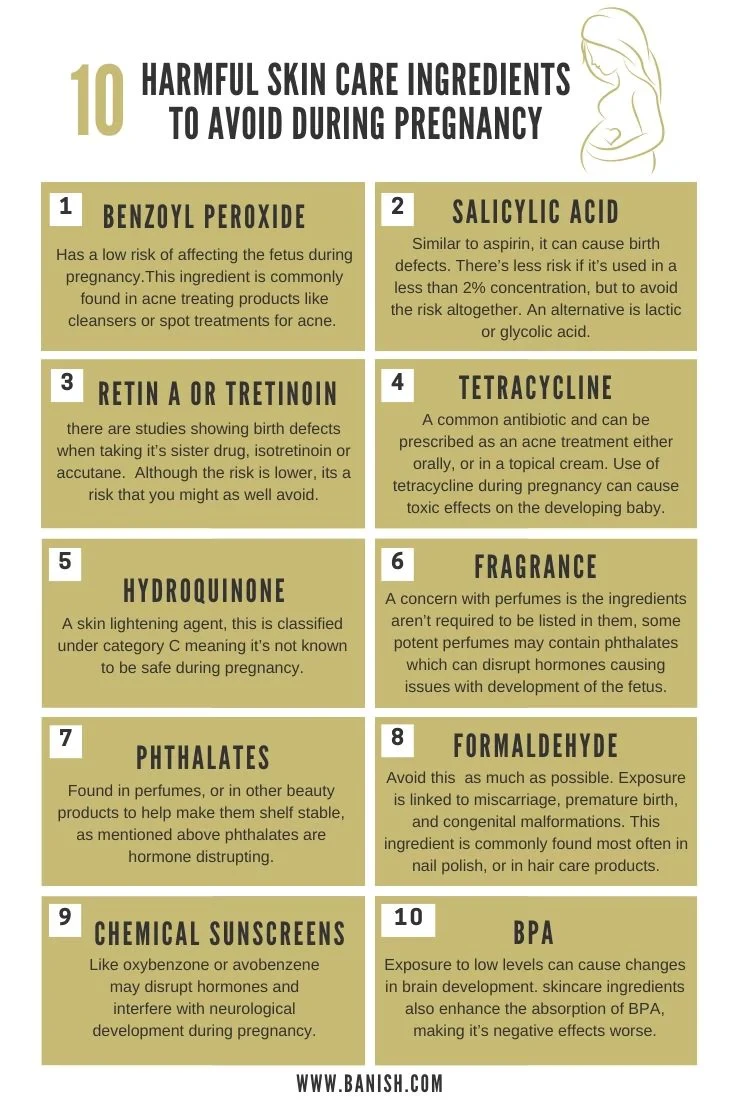What skincare to avoid during pregnancy
Pregnancy is a time of significant physical and hormonal changes, and these shifts can impact your skin in various ways, such as increased sensitivity, acne, or pigmentation issues like melasma. As a result, many women reconsider their skincare routines during pregnancy. While taking care of your skin is important, it is equally essential to ensure the safety of both you and your developing baby. Some common skincare ingredients and treatments, though effective under normal circumstances, should be avoided during pregnancy due to potential risks. Here is a guide on what skincare to avoid when expecting:
1. Retinoids (Vitamin A Derivatives)
Retinoids, including tretinoin, isotretinoin, adapalene, and retinol, are commonly used to treat acne and signs of aging. However, oral retinoids like isotretinoin (commonly prescribed for severe acne) are known to cause serious birth defects and are strictly contraindicated in pregnancy. Topical retinoids may also pose a risk, although the absorption is less. As a precaution, pregnant women are advised to avoid all forms of retinoids in skincare.
2. Salicylic Acid (High Concentration)
Salicylic acid is a beta hydroxy acid (BHA) used for treating acne and exfoliating the skin. In high doses (such as oral formulations or strong chemical peels), salicylic acid can pose a risk to the fetus. Topical use in low concentrations (under 2%) is generally considered safe, but it is best to consult your healthcare provider before use. Alternatives like glycolic acid or lactic acid in lower concentrations are often recommended instead.
3. Hydroquinone
Hydroquinone is a skin-lightening agent used to treat hyperpigmentation. Because of its high absorption rate through the skin, it is recommended to avoid hydroquinone during pregnancy. While there is limited conclusive evidence about its effects on fetal development, the high systemic absorption raises concerns. Safer alternatives include vitamin C, azelaic acid, or kojic acid for managing dark spots.
4. Chemical Sunscreens
Some chemical sunscreens contain ingredients like oxybenzone and avobenzone, which can be absorbed into the bloodstream and may act as hormone disruptors. Oxybenzone, in particular, has been linked to potential developmental issues. During pregnancy, it’s safer to use physical (mineral) sunscreens containing zinc oxide or titanium dioxide, which sit on the skin’s surface and provide effective UV protection without absorption.
5. Essential Oils (Certain Types)
While many essential oils are natural, not all are safe during pregnancy. Oils like rosemary, sage, jasmine, and clary sage may stimulate uterine contractions or have hormonal effects. It’s best to avoid using essential oils in concentrated forms, especially during the first trimester, unless advised otherwise by a medical professional.
6. Formaldehyde and Parabens
Formaldehyde and its derivatives (often found in nail polish, hair straightening treatments, and some preservatives) are potential carcinogens and should be avoided during pregnancy. Parabens, used as preservatives in skincare and cosmetics, are also under scrutiny for their potential endocrine-disrupting effects.
Conclusion
Pregnancy calls for extra caution in your skincare routine. Avoid potentially harmful ingredients like retinoids, hydroquinone, and certain chemical sunscreens. Always consult your doctor or dermatologist before starting any new product. Look for safer, pregnancy-friendly alternatives that support your skin without compromising the health of your baby.

Related Blog
What Causes Oily Skin and Can It Be Managed Naturally? Exploring Root Causes and Gentle Solutions
Aug 2, 2025 by Admin
General
What Are the Signs That You Have Sensitive Skin? Key Symptoms to Help You Identify This Delicate Skin Type
Aug 1, 2025 by Admin
General